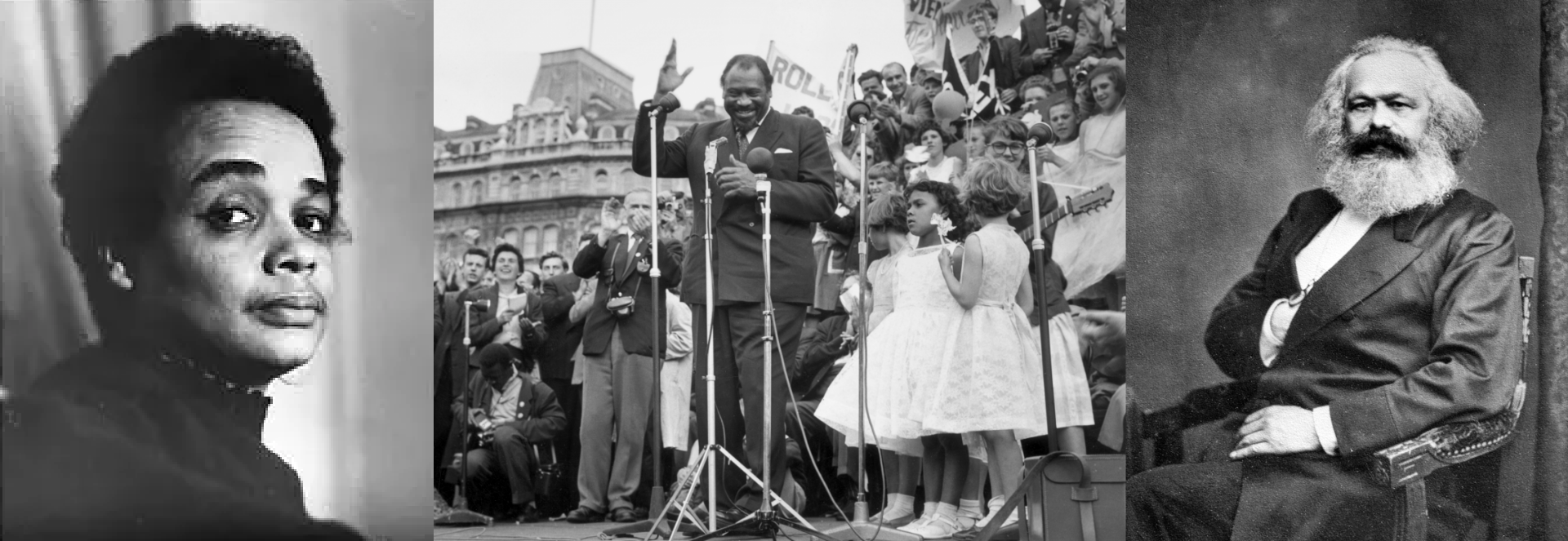I must pay tribute to Grace Killens, who played a vital role in hosting us and holding the Harlem Writers Guild together for the many years that her husband John Oliver Killens presided. She was an immensely nourishing presence.
In assessing the work of John Oliver Killens one needs to begin with World War II, that so-called battle for democracy in which Black soldiers, including John himself, faced the daily humiliation and unnecessary dangers serving in a Jim Crow army. This experience was brilliantly described by Killens in his powerful novel, And Then We Heard Thunder. Right after that war, there was a wave of racist violence nationwide which made it clear that the war had brought no change in the African-American’s political and social status. This racist violence was soon joined by a rising anti-communist hysteria, which saw in every demand for racial equality the “evil” hand of Moscow. It was a period when W.E.B. DuBois was put in shackles for not registering as a so-called foreign agent, when Paul Robeson was barred from making a living at home or traveling abroad. It was a time of Emmett Till, whose unrelenting mother forced America to see its handiwork in the mutilated body of her 14-year-old lynched son.
It was also a time when it was still a “curious thing to make a poet Black and bid him sing,” as Countee Cullen wrote. For one could count published Black writes on the fingers of both hands and still have some fingers to spare. Thus, it was a major event when John Oliver Killens came to Philadelphia around 1955 to participate ina joint celebration of the publication both of his ground-breaking first novel Youngblood and a collection of verse by Lucy Smith and myself, Give Me A Child, whose theme was peace and social justice. Immediately we recognized each other as fellow artist-warriors. And so John invited Lucy and myself to move to New York and join the Harlem Writers Guild. Unfortunately, Lucy was unable to go, but nothing could hold me back.
In 1959, I helped John organize the first National Conference of Black Writers, which was held at the Henry Hudson Hotel with the cooperation of the American Society of African Culture. Incidentally, a second Black Writers conference was later held at what was then called the New School for Social Research at which a panel consisting of Abby Lincoln, Alice Childress and myself for the first time raised the issue of the slanderous portrayal of Black women in white American fiction.
John was a magnet for both artists and political figures. There was a constant stream of visitors to John’s home, which took on the character of a pilgrimage–for John was revered for militancy combined with solid common sense. He maintained strong friendships with the leading Black intellectuals and artists of the time, people such as Arna Bontemps, Langston Hughes, Saunders Redding, and Sterling A. Brown. John’s advice was constantly being sought by political figures on the front lines of the freedom struggle. Ordinary people, too, having read or heard about John’s powerful work, came to him to complain of their mistreatment and to ask John to act as their tribune.
In the Guild we didn’t worry our heads about “Art for Art’s sake,” a popular theory of the time, as it is today. That was a luxury we could not afford. Nor could we be induced to tailor our work for the market. Of course we were all eager to be published–but being published could not be an end in itself. For we in the Guild were first and foremost about truth and humanity, about serving our people, about liberation. It was not that we were not interested in recognition or in financial success. Certainly we were striving for some easement from our steady grind of poverty and precarious living. Indeed many of us were as poor as churchmice, forced to produce literature and hold down a full-time job at the same time.
There was real cameraderie among us, little sense of competition, no envy but rather genuine joy at one another’s success. Of course, the feeling was not completely altruistic, for we understood that a breakthrough by any of us would pave the way for the success of others. But in that early period of the Guild we saw the achievement of success most of all as a political victory, as a breakthrough against an arrogant, racist literary Establishment determined to keep the opening for us as narrow as possible. It was a literary Establishment which might allow us to adorn the fabric of white experience–but it was made quite clear to us that the white experience, the white aesthetic, was the gold standard, the bearer of universality. And universality was precisely what they believed we could not possibly represent. To win approval we were not to think of ourselves as Black writers creating a Black literature but as writers who just happened to be Black. We in the Harlem Writers Guild declined the offer. For we had acquired self-confidence and pride, borne up as we were upon the wave of the freedom movement both here and in Africa, where the ground was clearly shaking under the colonial masters.
And then there was the Cuban revolution! Fidel came to the united Nations as spokesman of the agony of the Third World, of the oppressed everywhere. For hours he held forth on the wretchedness not merely suffered by the poor but perpetrated on the poor–enforced by a handful of powerful interests in a handful of wealthy countries. Fidel took up the cause of the wretched of the earth, the cause of the indigenous–took up the Black Man’s Burden.
Malcom X was listening to that voice, as was John Oliver Killens, John Henrik Clarke, as was a wonderful and all too little known Philadelphia poet Lucy Smith, who has just passed away. And I was listening too. The entire Harlem Writers Guild was listening. And some months later, when Fidel made a return visit to the UN General Assembly and when they accused Fidel of plucking live chickens in his hotel room and sent him packing (at the instigation of the State Department). And when no one was prepared to accommodate him and the rest of the Cuban delegation, Harlem and the Hotel Theresea opened their arms. At that very moment, the Guild was meeting in my small Lower East Side apartment, and we were settling in for a reading by John Oliver Killens. The phone rang, John Henrik Clarke answered for me and announced to us that Fidel was on his way to Harlem. The atmosphere was electric. No need for discussion–we just piled out of the apartment and headed uptown to join the thousands already lining the streets of Seventh Avenue.
In the Guild, John acted like a proud papa, taking the greatest personal interest in each of us, encouraging, cajoling us to work hard at our craft. We all subjected one another’s work to a serious and severe critique. And the fruit of this process was hundreds of published books and dramatic works, many of which have become treasures and have earned a permanent place in the canon of African-American literature.
Harlem Writers Guild meetings were more than readings. Invariably we began with intense and excited discussion about the political events of the day. Of course, many of us did not confine ourselves to discussion but directly plunged into the movement, protesting, picketing and demonstrating.
John was an inspiration. What John did was help build up our self-confidence, help dig for and sharpen the talent he knew was in all of us, sometimes more than we ourselves realized at the time. At the same time, possessed of a keen wit and discerning intelligence, John could be merciless in his criticism when in our song he detected false notes.
I am particularly proud of the extraordinary contributions made by the powerful group of women in the Guild, starting with Rosa Guy, one of the Guild’s founding members, a group which came to include Paula Marshall, Audre Lorde, Alice Childress, Ruby Dee, Maya Angelou and many others. I myself had the honor of serving as vice-president of the Guild for a few years, and briefly as acting president.
Of course, our group included a distinguished body of men as well, such as Irving Burgie, Godfrey Cambridge, Walter Christmas, John Hendrik Clarke, Ossie Davis, Lonnie Elder, the Third, Bill Forde, and Julian Mayfield.
A final thought: John was not flashy or charismatic. Soft-spoken and unpretentious, he nevertheless commanded immense respect for his political astuteness and his integrity. He had rejected the trappings of success that were for a moment held out to him in Hollywood. He successfully navigated the many minefields laid by the enemy so that those of us who chose to follow him could and did sail safely. It is a matter of profound regret that John Oliver Killens’ enormous contribution both as an artist and political guide has yet to receive the full recognition it deserves.
I close with one of John’s favorite admonitions for those wishing to pursue a literary career, which he borrowed from Shakespeare, and has always remained with me…
This above all – to thine ownself be true
And it must follow as the night the day,
Thou canst not then be false to any man.
William Shakespeare


